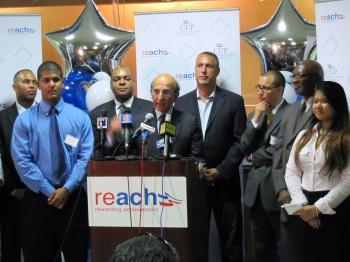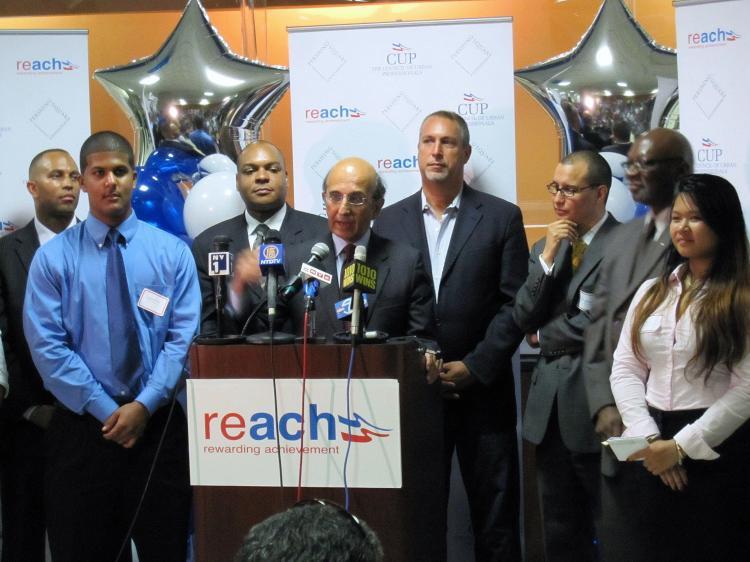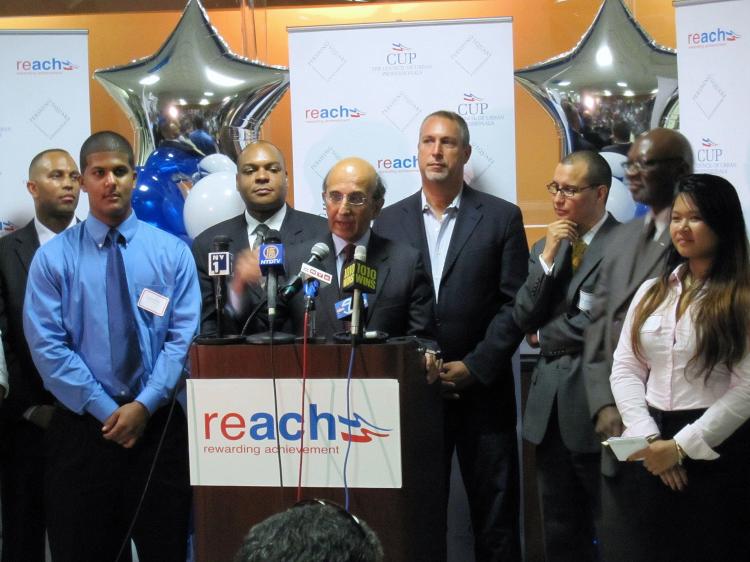NEW YORK—More than one thousand inner city high school students received more than $825,000 collectively on August 5th for performing well on their Advanced Placement exams as part of a part of program that rewards students for achieving passing grades on the exams.
Recipient students and their families attended the payout reception at a Chase Bank branch in Manhattan where program alumni and local government officials spoke.
The Rewarding Achievement Program (REACH), a type of pay-for-performance effort that began in 2007, chose 31 participating inner city high schools that serve a large percentage of low-income Latino and African-American students.
The goal of the program is to, “Encourage more young people to take on more academically rigorous courses at their high schools [and] prepare themselves appropriately so that they could achieve once they get to college,” explained the program’s Executive Director, Edward Rodriguez.
Advanced Placement (AP) courses, on subjects from U.S. history and English composition to chemistry and calculus, are college level courses offered at high schools that culminate in May with an AP exam administered by the College Board. Exams are scored on a range from one to five, with five being the highest and one the lowest. Passing students can receive college credits towards graduation.
New York City Schools Chancellor Joel Klein described the awards as investments in students to encourage enrollment in more rigorous courses despite their surroundings.
“Teachers made a bet on me and education led me to believe I can do things, that growing up in the neighborhood I grew up in weren’t routinely expected,” a reminiscent Klein said.
This year compared to last, 21 percent more AP exams were passed by REACH students. Among African-American and Latino American students, an increase of 328 more passed exams, bringing the percentage up 35 percent.
For many students, the prospect of a monetary award encouraged them to take exams they previously would not have. However, more exams taken and exams passed collectively do not necessarily mean that students have improved individually.
“Many more students have considered taking AP classes when the financial incentive is layered upon the possibility of earning college credit,” said Jane Viau, an AP statistics teacher at the Frederick Douglass Academy in Harlem. Viau’s school, a participating REACH school, saw a 65 percent increase in both the amount of AP exams taken as well as the number of exams passed.
My Le, a 2008 scholar who attends Carnegie Mellon University after having graduated from DeWitt Clinton High School in the Bronx took four AP exams her senior year. She cited the financial incentive as a large factor that pushed her to aim higher academically.
“Had it not been for REACH,” said Le, “I would have probably taken a part-time job during my last year in high school, which would have just drained me and that would mean that I would have less time to focus on my academics. But because REACH was there, I saw that if I didn’t work I can use that extra time to study and hopefully get that three, four, or five so that I could get that money.”
In addition to providing financial incentives, REACH also offered free AP preparation courses in an attempt to bridge the gap between these inner city students and those who are able to pay for traditional courses offered by companies like Kaplan and Barron’s.
Students who completed the sessions had the potential to receive $1,000 for each score of five on an AP, $750 for a four, and $500 for a three. Those who did not attend could receive $500, $400, and $300 respectively.
Earning extra money as a student can be extremely helpful many students noted. For some high school seniors who are off to college this fall, these awards were issued at a critical time.
Eighteen year-old Evelin Henriquez, a Massachusetts Institute of Technology first-year said, “I plan to use all my money for school supplies or stuff for my dorm, clothing that I need to take to college, all the supplies that I need to live on college.”
“I’m planning on getting either my laptop or college dorm necessities, or saving it for a trip to Europe next summer we want to take together,” added 17 year-old friend Lorena Rodriguez, who will be attending Amherst College.
Recipient students and their families attended the payout reception at a Chase Bank branch in Manhattan where program alumni and local government officials spoke.
The Rewarding Achievement Program (REACH), a type of pay-for-performance effort that began in 2007, chose 31 participating inner city high schools that serve a large percentage of low-income Latino and African-American students.
The goal of the program is to, “Encourage more young people to take on more academically rigorous courses at their high schools [and] prepare themselves appropriately so that they could achieve once they get to college,” explained the program’s Executive Director, Edward Rodriguez.
Advanced Placement (AP) courses, on subjects from U.S. history and English composition to chemistry and calculus, are college level courses offered at high schools that culminate in May with an AP exam administered by the College Board. Exams are scored on a range from one to five, with five being the highest and one the lowest. Passing students can receive college credits towards graduation.
New York City Schools Chancellor Joel Klein described the awards as investments in students to encourage enrollment in more rigorous courses despite their surroundings.
“Teachers made a bet on me and education led me to believe I can do things, that growing up in the neighborhood I grew up in weren’t routinely expected,” a reminiscent Klein said.
This year compared to last, 21 percent more AP exams were passed by REACH students. Among African-American and Latino American students, an increase of 328 more passed exams, bringing the percentage up 35 percent.
For many students, the prospect of a monetary award encouraged them to take exams they previously would not have. However, more exams taken and exams passed collectively do not necessarily mean that students have improved individually.
“Many more students have considered taking AP classes when the financial incentive is layered upon the possibility of earning college credit,” said Jane Viau, an AP statistics teacher at the Frederick Douglass Academy in Harlem. Viau’s school, a participating REACH school, saw a 65 percent increase in both the amount of AP exams taken as well as the number of exams passed.
My Le, a 2008 scholar who attends Carnegie Mellon University after having graduated from DeWitt Clinton High School in the Bronx took four AP exams her senior year. She cited the financial incentive as a large factor that pushed her to aim higher academically.
“Had it not been for REACH,” said Le, “I would have probably taken a part-time job during my last year in high school, which would have just drained me and that would mean that I would have less time to focus on my academics. But because REACH was there, I saw that if I didn’t work I can use that extra time to study and hopefully get that three, four, or five so that I could get that money.”
In addition to providing financial incentives, REACH also offered free AP preparation courses in an attempt to bridge the gap between these inner city students and those who are able to pay for traditional courses offered by companies like Kaplan and Barron’s.
Students who completed the sessions had the potential to receive $1,000 for each score of five on an AP, $750 for a four, and $500 for a three. Those who did not attend could receive $500, $400, and $300 respectively.
Earning extra money as a student can be extremely helpful many students noted. For some high school seniors who are off to college this fall, these awards were issued at a critical time.
Eighteen year-old Evelin Henriquez, a Massachusetts Institute of Technology first-year said, “I plan to use all my money for school supplies or stuff for my dorm, clothing that I need to take to college, all the supplies that I need to live on college.”
“I’m planning on getting either my laptop or college dorm necessities, or saving it for a trip to Europe next summer we want to take together,” added 17 year-old friend Lorena Rodriguez, who will be attending Amherst College.





